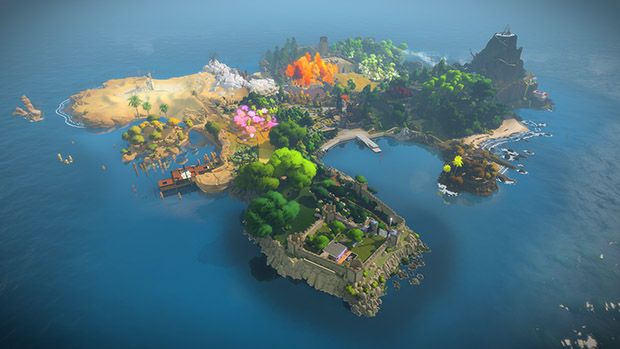This post has not been edited by the GamesBeat staff. Opinions by GamesBeat community writers do not necessarily reflect those of the staff.

In a recent, two part interview with Buddhist Geeks, Jonathan Blow, creator of 2008’s critically acclaimed indie title, Braid, candidly discussed some of his personal, spiritual outlooks, and how they influence his game design, specifically in his newest project, The Witness, slated to be released sometime this year.
Anyone who has paid a visit to the official homepage for The Witness and has read the introductory quote from former astronaut Russel Schweickart can surmise that Jonathan Blow is once again departing from traditional game design and narrative. However, in this interview, Blow touches on some pretty specific topics in regards to spirituality and how it affects his role as a game designer.
Lately, the gaming world has been treated to some beautiful, contemplative, and avant garde titles that eschew traditional gameplay mechanics and narrative in favor of trying something different. 2012 alone saw the release of titles such as Journey, Papo & Yo, and The Unfinished Swan, all developed by small, independent teams. These titles have been lauded and praised for being emotionally charged as well as being a breath of fresh air in a time when violent FPS titles seem to be pumped out with predictable regularity.
Like his fellow indie developers, Blow considers game design a chance for “personal visualization of spiritual concepts.” For Blow, this means creating a game that questions people’s ideas about duality. Although he does make it a point to emphasize that his notions about spirituality are personal, he says that his games may feature “a report from my own current viewpoint, what things look like and what things feel like to contextualize what I’ve understood in the past and what I understand now.”
In the interview, Blow discusses a few Buddhist notions such as non-duality, and self reference. Sakyamuni Buddha taught that we are all interconnected interdependent, and that there is no such thing as a concrete, unchanging and permanent self. While he does not identify himself as a Buddhist in the interview, Blow refers to being an individual as an “abstraction” and says while individualism may be “very useful for survival as a human being, it isn’t necessarily the closest thing to the truth.”
As far as getting these themes across in a video game, Blow emphasizes that, although this kind of expression is in the game, he “doesn’t feel like he is in a place where he can tell people what is true,” and that “his perception of the world changes at a rapid place.” So how does he avoid coming off as preachy? By being vulnerable. “It presents you from positioning yourself above the person you are speaking to. It’s like speaking to an old friend you love rather than making a big presentation to impress somebody.”

With designers like Jonathan Blow, Minority Media’s Vander Caballero, and thatgamecompany’s Jenova Chen leading the way for up and coming indie developers to express more personal stories as well as more spiritual themes in video games, combined with the ease of digital distribution, we can begin to expect creative titles like Braid, Journey, and Papo & Yo to be available to larger audiences and continue to re-contextualize video games as a medium. At a time when even the Vice President of the United States of America is calling on the video game industry to “improve it’s image,” titles like The Witness and developers like Jonathan Blow may be exactly what the doctor ordered.
